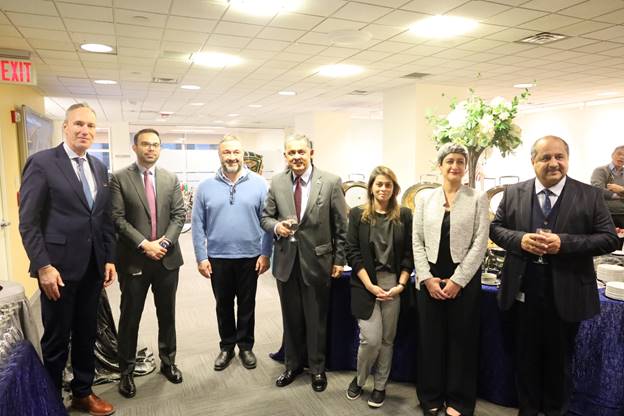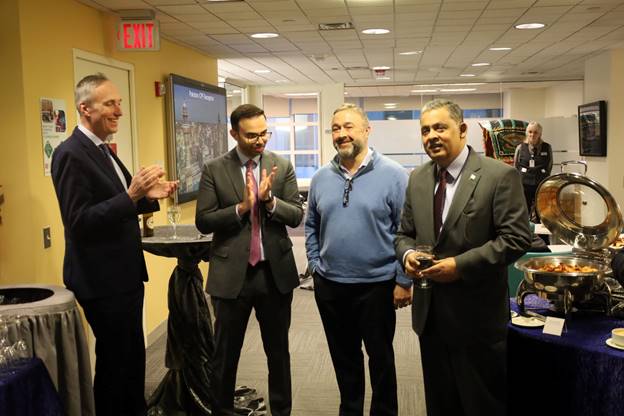

Ambassador Sheikh thanked the World Bank management for its support in getting the CPF approved and assured full commitment of the government of Pakistan to the realization of the objectives outlined in it
World Bank Approves Country Partnership Framework for Pakistan
By Elaine Pasquini

Washington: “The landmark Country Partnership Framework (CPF) being launched today defines the strategic collaboration between the World Bank and Pakistan,” Rizwan Saeed Sheikh, Pakistan’s ambassador to the United States, said on January 14, 2025, at a reception hosted by the World Bank Group following the approval of the Country Partnership Framework of Pakistan by the World Bank Board.
“This is not only a result-oriented, but impact-oriented program that would benefit the fifth most densely populated country in the world,” he added, also highlighting the extensive efforts and collective teamwork that facilitated the successful development and approval of the framework.
“A significant amount of effort was invested in the preparatory process of this framework, which emerged from an arduous effort on the part of both the World Bank and the relevant government departments in Pakistan,” the ambassador noted.
The World Bank's Vice President for South Asia, Martin Raiser, attended the celebratory reception, along with the Executive Director for Pakistan at the World Bank Dr Tauqeer Shah, officials from the Embassy of Pakistan and members of the World Bank South Asia region.
In his welcoming remarks, Vice President Raiser congratulated Ambassador Sheikh and expressed his appreciation for the collaborative efforts of the World Bank, the government of Pakistan, and other World Bank Group partners, such as the International Finance Corporation (IFC), in successfully finalizing the framework.
Spanning 2025-34, the CPF focuses on six key areas and nine objectives, including reducing child stunting through improved access to health, nutrition and population services, reducing learning poverty through improved access to quality schools and foundational learning.
Combating climate change through increased resilience to droughts, heatwaves and natural disasters, increased decarbonization through access to cleaner, more sustainable energy and reduced air pollution is an important element of the CPF.
Another key focus is increasing fiscal space, better management and more progressive public expenditures for development, along with more inclusive economic opportunities through increased private sector investments and exports. These objectives will be supported by increased digital development, stability and openness of the economy and social protection.
The CPF governs the strategic partnership between the World Bank Group, including the International Development Association - IDA, the International Bank for Reconstruction and Development - IBRD, the International Finance Corporation - IFC, and the Multilateral Investment Guarantee Agency - MIGA and the Government of Pakistan. The preparatory process involved extensive consultations with government representatives, both at the federal and provincial levels, as well as with academia, civil society representatives, the private sector, and other bilateral and multilateral partners of Pakistan. The partnership builds upon core analytics conducted by the World Bank Group over recent years which identified the most acute development challenges facing Pakistan and offered suggestions for reforms.
Pakistan has the distinction of being the first country where a longer-term CPF has been launched by the World Bank, reflecting a closer partnership and a higher level of trust between the two. The CPF is proposed as a 10-year “rolling CPF”, with regular annual reviews to assess progress towards the proposed objectives. A mid-term review will allow for the evaluation of achievements against objectives and appropriate adjustments to ensure continued support for the long-term strategy.
In closing, Ambassador Sheikh thanked the World Bank management for its support in getting the CPF approved and assured full commitment of the government of Pakistan to the realization of the objectives outlined in it. Congratulating the World Bank for achieving the replenishment target of $100 billion under IDA21, he reaffirmed Pakistan’s resolve to further broaden and deepen the partnership and engagement with this important institution.
(Elaine Pasquini is a freelance journalist. Her reports appear in the Washington Report on Middle East Affairs and Nuze.Ink.)

